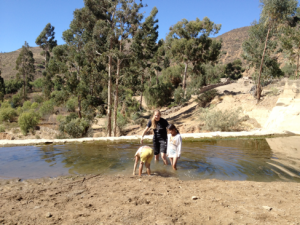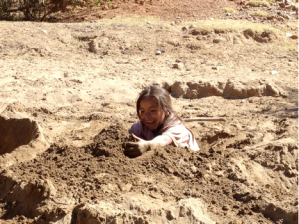Building Sandcastles on a Bolivian Beach
- Posted In : Stories
- 3 : comments
The area surrounding Morado K’asa is exceptionally dry, especially during the winter months. Even so, a tiny oasis hides tucked away between the hills. A previous volunteer wrote about stumbling upon the tiny stream that creates a small pool in which the children love to swim. Well, this Thursday, I got to visit the small mayu (“river” in Quechua) as well. I expected it to be lovely, if small. I didn’t expect the hours of fun that ensued. Bolivia has no coastline, but with a little imagination and the enthusiasm of three little girls, a visit to the small river transformed into a day at the beach! At this beach, the coveted find isn’t seashells. The girls eagerly searched for tiny minnows that they put in a tin to bring home. Apparently, the fish are an excellent addition to muti (huge boiled corn kernels that are a fundamental part of the diet on the Bolivian countryside).
At this beach, the coveted find isn’t seashells. The girls eagerly searched for tiny minnows that they put in a tin to bring home. Apparently, the fish are an excellent addition to muti (huge boiled corn kernels that are a fundamental part of the diet on the Bolivian countryside).
After searching for fish and splashing around in the shallow water, the girls and I moved to rest on the beach. Soon we began to build a castle; it started simple and grew more and more complex. The result was a little village we “creatively” named Morado K’asacita, complete with a castle with four beds for each of us, an exterior wall, a second room, a bathroom with a miniature toilet and shower, an orchard with “peach trees,” a tiny reproduction of the adobe ovens the people of Morado K’asa bake bread in, a kitchen with a tiny stove and firewood beneath, and a mountain. “Every castle has a mountain,” Nélida (in green) explained of her addition.
 Of course, a day at the beach isn’t complete without someone getting buried in the sand. The other two girls started heaping dirt on eight-year-old Vicky. You can tell her reaction from this picture. (FYI, that is laughter ;))
Of course, a day at the beach isn’t complete without someone getting buried in the sand. The other two girls started heaping dirt on eight-year-old Vicky. You can tell her reaction from this picture. (FYI, that is laughter ;))
The Spanish and Quechua words used to describe this kind of swimming are bañarse and bañakuy, respectively, both of which mean “to bathe.” Clearly, this trip to the river didn’t exactly accomplish that goal!



Fredric
Hello , I do consider this is a superior site.
I stumbled upon it on Yahoo , I’ll come back once again.
Teresita
Greetings! Very helpful advice on this article!
It is the small changes that make the largest changes. Thanks a lot for
sharing!
Porfirio
I wanted to thank you for this great read!!